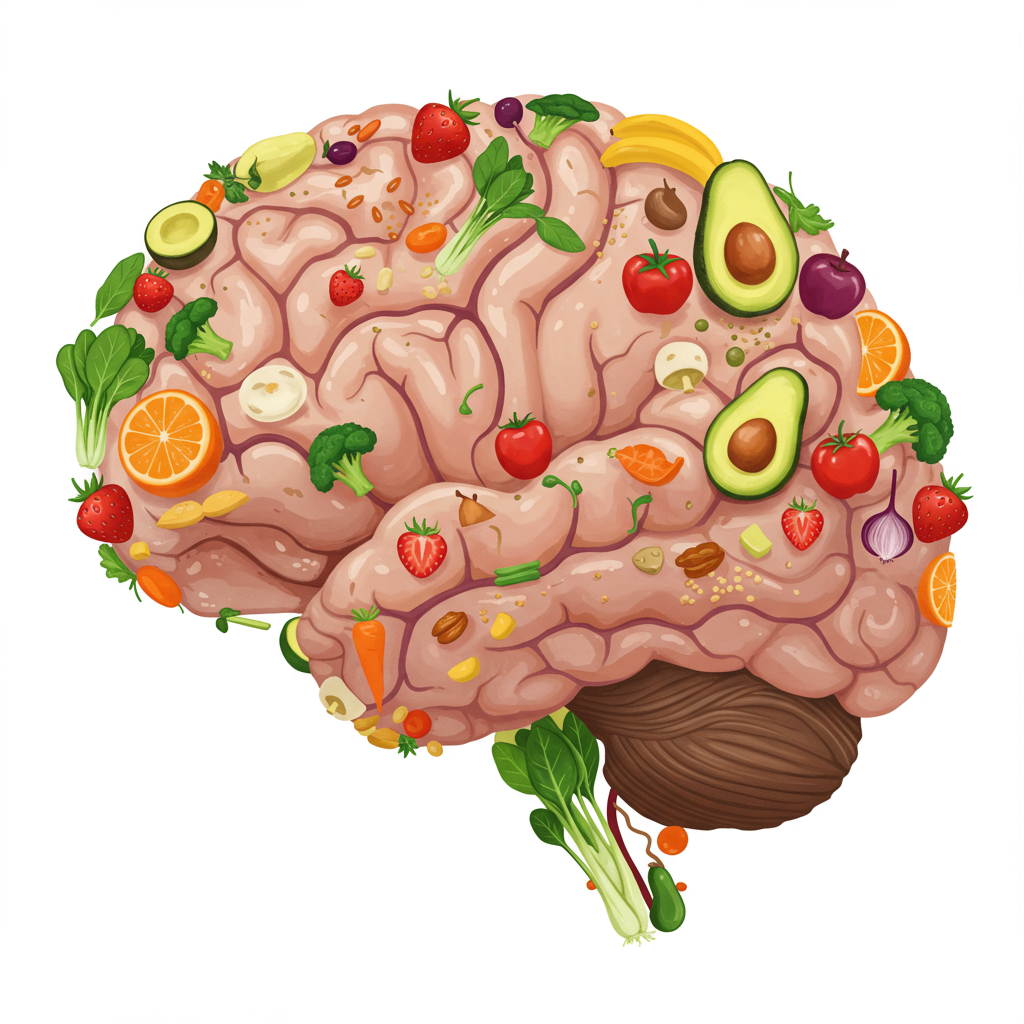Every day, we make countless decisions about what we eat and drink. But what if these seemingly simple choices hold the key to protecting our most vital organ – the brain? Growing evidence reveals a powerful connection between our diet and cognitive health, particularly concerning the risk of Alzheimer’s disease. While no single food or diet can guarantee prevention, adopting specific eating habits can significantly influence brain function and resilience over time.
June marks Alzheimer’s and Brain Awareness Month, shining a light on a condition impacting millions. Nearly seven million Americans currently live with Alzheimer’s, a number projected to swell to nearly 13 million by 2050. This underscores the urgent need to explore all potential avenues for risk reduction, and diet is emerging as a critical factor within our control.
The Intricate Gut-Brain Connection
Recent scientific discoveries highlight a strong, two-way communication highway between your gut and your brain. This connection, known as the gut-brain axis, involves complex signaling between your digestive system and the central nervous system. At the heart of this axis lies the gut microbiome – trillions of bacteria, viruses, and fungi residing in your intestines.
A healthy, diverse microbiome is crucial not just for digestion, but also for manufacturing essential signaling molecules and neurotransmitters that support brain health. It helps maintain the integrity of the blood-brain barrier, a protective shield preventing harmful substances from reaching the brain. Conversely, an unhealthy microbiome profile can disrupt this balance. It may fail to produce enough beneficial compounds and can contribute to a leaky gut, allowing pro-inflammatory substances to enter the bloodstream. These harmful elements can then cross a compromised blood-brain barrier, potentially triggering or worsening brain inflammation.
Research increasingly points to a distinct gut profile associated with Alzheimer’s, characterized by increased inflammatory markers. Studies have even suggested that Alzheimer’s symptoms could be influenced by gut microbiota composition. This reinforces the idea that nurturing your gut health through diet directly benefits your brain.
foods That May Harm Brain Health
Just as certain foods nourish the brain, others can actively work against it. Identifying and limiting these detrimental elements is a foundational step in a brain-healthy diet.
The Pitfalls of Processed Foods
Ultra-processed foods – think packaged snacks, sugary cereals, convenience meals, and fast food – are known to be bad for overall physical health, but their impact on the brain is equally concerning. These foods are often high in unhealthy fats, added sugars, and artificial ingredients while lacking essential nutrients and fiber.
Studies have linked higher consumption of ultra-processed foods to a significantly increased risk of accelerated cognitive decline. Regularly consuming these items can contribute to feelings of depression, reduced well-being, and a noticeable dip in mental sharpness over time. They promote systemic inflammation, creating an unfavorable internal environment for brain cells.
Refined Carbohydrates and Inflammation
Foods high in refined carbohydrates, such as white bread, white rice, pastries, and sugary drinks, have a high glycemic index (GI). This means they cause rapid spikes in blood sugar levels. Frequent blood sugar surges can lead to chronic inflammation and insulin resistance throughout the body, including the brain.
Chronic inflammation is not something you typically feel like a sore muscle. It’s a low-grade, persistent state that damages cells and disrupts normal processes. In the brain, inflammation and insulin resistance are strongly implicated in harming brain health and memory function over the long term, potentially contributing to the development of Alzheimer’s pathology. Opting for whole, complex carbohydrates is vital for maintaining stable blood sugar and reducing inflammatory load.
The Question of Artificial Sweeteners
Zero-calorie or diet drinks often contain artificial sweeteners like aspartame. While marketed as healthier alternatives to sugar, research suggests potential negative impacts on brain health. Some indications suggest artificial sweeteners might affect memory and potentially contribute to anxiety.
A notable study found that individuals who drank just one or more artificially sweetened beverages daily were three times more likely to develop dementia compared to those who avoided them. This highlights the importance of being mindful of what’s in your drink and reconsidering the perceived benefits of diet options containing these artificial compounds.
Nourishing Your Brain with the Right Foods
Shifting focus from foods to avoid to foods to embrace is key. A brain-healthy diet emphasizes whole, nutrient-dense options that support cognitive function, reduce inflammation, and foster a thriving gut microbiome.
The Power of Whole Foods
Prioritize consuming foods in their most natural state. Whole grains (like oats, brown rice, quinoa), fruits, and vegetables are packed with fiber, vitamins, minerals, and antioxidants. Fiber is particularly important as it feeds beneficial gut bacteria, which in turn produce beneficial compounds for the brain.
When it comes to fruit, eating the whole fruit is generally preferable to drinking juice, even 100% juice. Whole fruit contains fiber that slows sugar absorption and provides more sustained energy and nutrient delivery. Juicing often removes this crucial fiber.
Hydration and Brain-Boosting Beverages
Water is the best beverage choice for hydration and overall health, including brain function. Dehydration can negatively impact concentration and cognitive performance.
For alternatives to plain water, consider options that offer additional benefits:
Green Tea: Rich in antioxidants, particularly catechins, which have neuroprotective properties.
Infused Water: Adding lemon, berries, or cucumber provides flavor without added sugars or artificial sweeteners.
Golden Milk: A warm drink made with turmeric (often with milk/plant-based milk and other spices like ginger). Turmeric contains curcumin, a potent anti-inflammatory compound with known benefits for gut and brain health, helping to combat leaky gut and reduce inflammation relevant to Alzheimer’s.
These small beverage swaps can contribute significant antioxidant and anti-inflammatory benefits.
Proven Dietary Patterns for Brain Health
Rather than focusing on single foods, adopting a comprehensive dietary pattern provides synergistic benefits. Extensive research points to specific diets with the strongest evidence for supporting long-term brain health and reducing dementia risk.
The Mediterranean Diet
Widely recommended by health professionals, the Mediterranean diet is based on traditional eating habits from countries bordering the Mediterranean Sea. It is naturally low in saturated fat and emphasizes:
Abundant vegetables and fruits
Whole grains
Legumes and beans
Nuts and seeds
Extra virgin olive oil as the primary fat source
Moderate intake of fish
Limited intake of red meat, processed foods, refined grains, and sweets
This pattern is inherently anti-inflammatory and rich in antioxidants and fiber, all crucial for supporting a healthy gut microbiome and protecting brain cells from damage.
The MIND Diet
The MIND diet (Mediterranean-DASH Intervention for Neurodegenerative Delay) is a hybrid approach combining principles of the Mediterranean diet and the DASH (Dietary Approaches to Stop Hypertension) diet. It specifically highlights foods with strong research links to brain health:
Green leafy vegetables (aim for 6+ servings/week)
Other vegetables
Berries (aim for 2+ servings/week)
Whole grains (aim for 3+ servings/day)
Nuts (aim for 5+ servings/week)
Beans (aim for 4+ servings/week)
Fish (aim for 1+ serving/week)
Poultry (aim for 2+ servings/week)
Olive oil as the primary cooking oil
Wine (optional, limit to 1 serving/day)
It recommends limiting or avoiding:
Red meats
Butter and margarine
Cheese
Pastries and sweets
Fried food
Studies consistently show that adhering closely to the MIND diet is associated with reduced risk of developing Alzheimer’s disease and slower rates of cognitive decline.
The Role of Inflammation in Alzheimer’s
Chronic inflammation, often fueled by diet, plays a significant role in the progression of Alzheimer’s disease. Unlike the acute inflammation that helps heal injuries, chronic inflammation is a persistent state of cellular stress. This low-level inflammation can damage brain cells, disrupt neural pathways, and facilitate the buildup of amyloid plaques and tau tangles – the hallmark pathologies of Alzheimer’s.
A diet rich in anti-inflammatory foods, such as those found in the Mediterranean and MIND diets, helps counteract this harmful process. Foods high in antioxidants (like berries and leafy greens), healthy fats (like omega-3s from fish and monounsaturated fats from olive oil), and specific compounds like curcumin from turmeric can help dampen the inflammatory response and protect brain tissue. Conversely, pro-inflammatory foods like processed meats, refined sugars, and unhealthy fats exacerbate this chronic state.
Supporting Your Diet: A Note on Supplements
While dietary changes are the cornerstone of a brain-healthy approach, certain supplements may offer additional support, particularly when transitioning or if dietary intake is insufficient.
Probiotics: These beneficial bacteria supplements can help enhance and maintain a healthy gut microbiome. They may be particularly useful if you don’t regularly consume fermented foods like yogurt, kefir, or sauerkraut. By supporting a balanced gut, probiotics can help decrease inflammation and improve gut barrier function, indirectly benefiting brain health.
- Vitamin D: Vitamin D is crucial for overall health, including gut health and brain function. Deficiency is linked to increased inflammation and the progression of neurological diseases like Alzheimer’s. Since obtaining sufficient Vitamin D through diet and sun exposure can be challenging for many, supplementation is often recommended.
- www.walb.com
- www.wfmz.com
- mcpress.mayoclinic.org
- my.clevelandclinic.org
- www.mindbodygreen.com
It’s important to view supplements as complementary to a healthy diet, not a replacement. Always consult a healthcare professional before starting any new supplement regimen.
Making Brain-Healthy Changes
The journey toward a brain-healthy diet doesn’t require drastic overnight changes. Small, consistent adjustments can accumulate into significant long-term benefits.
Start by identifying one or two areas to focus on. Could you swap your usual snack for a piece of fruit and a handful of nuts? Replace refined pasta with whole-wheat pasta or quinoa? Choose water or green tea instead of a sugary drink? Incorporate more vegetables into your meals?
Even individuals already experiencing cognitive changes can benefit from adopting healthier eating patterns. While it may not reverse existing damage, improving diet can reduce the overall burden on the body and brain, potentially supporting better function and quality of life for a period.
By consciously nourishing your body with whole, anti-inflammatory foods and supporting a healthy gut, you are directly investing in the health and resilience of your brain. It’s a powerful step you can take today for a healthier cognitive future.
Frequently Asked Questions
What is the gut-brain connection and how does it relate to Alzheimer’s?
The gut-brain connection is a complex communication system linking your digestive system and your brain. Your gut is home to trillions of microbes (the microbiome) that produce compounds influencing brain health. An unhealthy gut microbiome can lead to inflammation and disrupt the blood-brain barrier. Growing evidence suggests this inflammation and imbalance may contribute to the development and progression of Alzheimer’s disease pathology in the brain.
Which specific diets are recommended for brain health and reducing Alzheimer’s risk?
Research strongly supports adopting dietary patterns like the Mediterranean and MIND diets for brain health. The Mediterranean diet emphasizes vegetables, fruits, whole grains, legumes, nuts, and olive oil. The MIND diet combines this with the DASH diet, specifically highlighting foods like leafy greens and berries linked to better cognitive outcomes while limiting foods high in saturated and trans fats, added sugars, and processed items.
Should I avoid processed foods and sugary drinks to protect my brain from cognitive decline?
Yes, it is strongly recommended to limit or avoid ultra-processed foods, refined carbohydrates, and sugary or artificially sweetened drinks. These items promote inflammation, contribute to insulin resistance, and are linked in studies to increased risks of accelerated cognitive decline and dementia. Focusing on whole, nutrient-dense foods is a key strategy for supporting long-term brain health.
Conclusion
Taking proactive steps for brain health is increasingly vital as we live longer. While Alzheimer’s is a complex disease, the evidence is clear: the food we consume has a profound impact on our brain’s well-being. By understanding the gut-brain connection, limiting harmful processed items, and embracing nutrient-rich, anti-inflammatory foods characteristic of diets like the Mediterranean and MIND approaches, we can significantly influence our cognitive future. Making these dietary changes is a powerful, accessible way to support your brain’s resilience and vitality.
Word Count Check: 1168




